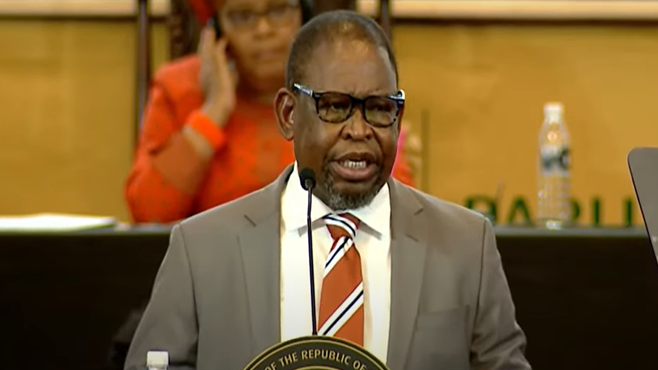Agriculture
‘Treasury gave signal of spending money in the right places’─── ELSABÉ RICHARD 08:22 Thu, 27 Oct 2022

The chief economist at Agri SA, Kulani Siweya, says Treasury’s plan to fix critical infrastructure, is a step in the right direction as this will bode well for the country’s economy.
He shared that prior to the Midterm Budget Policy Statement (MTBPS), which was delivered by Finance Minister, Enoch Godongwana, on Wednesday 26 October 2022, Agri SA was hopeful that the budget statement would outline critical measures to support the agricultural sector, especially amongst various crises that threaten the sector’s growth.
LEES OOK: Landbou-organisasie se verwagtinge vir mediumtermyn-begroting
“Coming so soon after the crippling Transnet strike, with ongoing load-shedding and high input costs, [we expect] Minister Godongwana to use the opportunity of the MTBPS to signal interventions that help to bolster the sector, which holds around 874 000 jobs and contributed more than 2% to GDP despite the challenges of the past three years,” shares Siweya.
He spoke to OFM News after the budget statement and said that the organisation’s expectations were met. “I think broadly speaking, the expectations were met in terms of national treasury giving signals of spending in the right places, particularly if you look at the infrastructure spending bill… I think that was quite encouraging.
ALSO READ: Sugar tax a threat to Agri master plan
“Remember infrastructure spending has a greater multiplier and this will generally bode well for the economy or create jobs.”
Highlights from the MTBPS
Load-shedding
With regards to the issue of load-shedding, Godongwana announced that several policies and regulatory changes aimed at creating a competitive energy market in a bid to tackle load-shedding, are underway.
This comes as agricultural organisations have spoken out against load-shedding’s impact on producers’ ability to produce food.
LEES OOK: Agri SA hoop vir oplossings tydens vergadering met #Eskom
He acknowledged that the intensity of load-shedding is having a disastrous effect on the country’s economy.
“We have therefore focused our efforts on reforms in the electricity sector. Several policies and regulatory changes aimed at creating a competitive energy market, are also under way.
“These include the removal of the licensing threshold for embedded generation projects, where the pipeline has grown to 100 projects, representing over 9000 MW of capacity.
“The Electricity Regulation Amendment Bill has been finalised. It provides for the establishment of an independent transmission and system operator, which will fundamentally transform the electricity sector.
“Reducing South Africa’s reliance on a single monopoly utility and unlocking massive new private investment in generation capacity will contribute significantly to long-term energy security,” said the minister.
Water-use licences
The minister shared that the government has cleared water-use licence backlogs. He said the process to establish a water regulator through the National Water Resources Infrastructure Agency Bill is also underway.
“The agency will enable effective management of bulk water infrastructure and facilitate private sector investment.”
Logistical challenges
Godongwana admittedly said that there is a crisis in South Africa’s logistics sector. He added that inefficiencies at port and railways are costing the economy billions and further undermines government’s efforts to raise growth.
ALSO READ: Transnet lift force majeure as workers return
“We welcome the end of the Transnet strike and are working with Transnet leadership and all stakeholders to address the challenges in the sector urgently. Several steps are being taken to introduce greater competition and efficiency into ports and rail.
“The National Assembly has passed the Economic Regulation of Transport Bill. It will establish an independent transport regulator to encourage greater competition and enable regulated access to the network.
ALSO READ: Transnet hopes to work more with agriculture industry
“In addition, requests for proposals have been issued for third-party access to the freight rail network and private-sector partnerships for the Durban Pier 2 and Ngqura container terminals,” said Godongwana further.
Infrastructure
The minister further said that the government is increasing on-budget infrastructure allocations in a bid to remedy the erosion of baselines.
“Over the medium term, the government consolidated spending on building new and rehabilitating existing infrastructure will increase from R66.7 billion in 2022/23 to R112.5 billion in 2025/26.
ALSO READ: Over 25 million potholes sprawled across South Africa's roads
“This includes roads, bridges, storm-water systems and public buildings. This makes spending on capital assets the fastest-growing item by economic classification.
“By delivering on public sector investments, we will crowd in private investment, improve public service provision and address backlogs; thus, igniting a virtuous cycle of higher investment, growth and employment potential.
“We are also committed to improving state capacity, project planning and preparation, procurement practices, and contract management. This will address chronic underspending of allocated infrastructure budgets, improve value for money and efficacy of our investments.”













